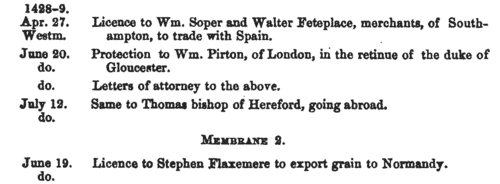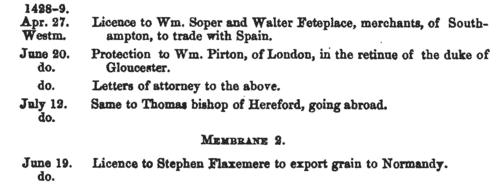Attehalle Surname Ancestry ResultsOur indexes 1000-1999 include entries for the spelling 'attehalle'. In the period you have requested, we have the following 17 records (displaying 11 to 17): Buy all | | | Get all 17 records to view, to save and print for £90.00 |
These sample scans are from the original record. You will get scans of the full pages or articles where the surname you searched for has been found. Your web browser may prevent the sample windows from opening; in this case please change your browser settings to allow pop-up windows from this site. Inhabitants of Leicester
(1103-1327)
The Corporation of Leicester commissioned the publication (in 1899) of extracts from the earliest borough archives, edited by Mary Bateson. This volume brings together several important sources: the borough charters; the merchant gild rolls (from 1196 onwards); tax returns; court rolls (from about 1260 onwards); mayoral accounts, &c. All the Latin and French texts are accompanied by English translations. Membership of the merchant gild was by right of inheritance (s. p. = sede patris, in his father's seat), or by payment of a fee called a 'bull' (taurus). The sample scan shows part of a gild entrance roll; those marked * paid their bull, and were thus, by implication, not natives, or at least not belonging to gild merchant families. By 1400 membership of the gild merchant had become the equivalent of gaining freedom of the borough (being a free burgess): but at this period the two were not necessarily the same, and some of the merchant gild members were not resident in the borough, merely traded there. Not all the tax rolls surviving for this period are printed: but full lists of names are given for a loan for redemption of pontage and gavelpence of 1252-3 (pp. 44-46); five tallages of 1269 to 1271 brought together in a single table (128-145); and tallages of 1286 (208-211), 1307 (255-257), 1311 (272-274) and 1318 (310-313). The portmanmoot (or portmote) was the borough court dealing with minor infractions and civil suits. Finally, there is a calendar of charters (from c.1232 onwards, 381-400), and a list of mayors, bailiffs (reeves), receivers and serjeants (401-407).
ATTEHALLE. Cost: £4.00.  | Sample scan, click to enlarge

| Deeds from Bath in Somerset
(1320-1329)
More than 500 mediaeval deeds survived in the muniment chest of Bath in Somerset, almost all dealing with the transfers of small plots of land in the city. Each names the grantor and grantee, describes the land, and is witnessed by other citizens. This printed edition was prepared by the Reverend C. W. Shickle, Master of St John's Hospital in Bath. Where (as in many cases) the earliest deeds were undated, he was able to assign periods to each on the basis of style and content, particularly the names of witnesses. ATTEHALLE. Cost: £4.00.  | Sample scan, click to enlarge

| Deeds from Bath in Somerset
(1330-1339)
More than 500 mediaeval deeds survived in the muniment chest of Bath in Somerset, almost all dealing with the transfers of small plots of land in the city. Each names the grantor and grantee, describes the land, and is witnessed by other citizens. This printed edition was prepared by the Reverend C. W. Shickle, Master of St John's Hospital in Bath. Where (as in many cases) the earliest deeds were undated, he was able to assign periods to each on the basis of style and content, particularly the names of witnesses. ATTEHALLE. Cost: £4.00.  | Sample scan, click to enlarge

| Clerks and Clergy in Herefordshire, Shropshire and Gloucestershire
(1327-1344)
The register of bishop Thomas de Charleton of Hereford, containing general diocesan business, but also including ordination lists for monks and clergy. Only a small proportion of the clerks went on to acquire benefices and remained celibate. Hereford diocese covered almost all Herefordshire, southern rural Shropshire, a westward arm of Worcestershire, and a northwestern slice of Gloucestershire.ATTEHALLE. Cost: £6.00.  | Sample scan, click to enlarge

| Deeds from Bath in Somerset
(1340-1349)
More than 500 mediaeval deeds survived in the muniment chest of Bath in Somerset, almost all dealing with the transfers of small plots of land in the city. Each names the grantor and grantee, describes the land, and is witnessed by other citizens. This printed edition was prepared by the Reverend C. W. Shickle, Master of St John's Hospital in Bath. Where (as in many cases) the earliest deeds were undated, he was able to assign periods to each on the basis of style and content, particularly the names of witnesses. ATTEHALLE. Cost: £4.00.  | Sample scan, click to enlarge

| The English in France
(1423)
King Henry VI of England (one of the grandsons of Charles VI of France) claimed the throne of France (and quartered the fleurs-de-lis of France with the lions of England on the royal standard) as had his predecessors since Edward III, as descendants of Philip IV of France. The English had real power or influence in Brittany, Normandy, Flanders and Gascony, and actual possession of several coastal garrisons, in particular Calais, where the French inhabitants had been replaced by English. Henry VI came to the throne only seven years after his father had trounced the French at Agincourt; but his cousin, Charles VII, who became king of France in the same year, spent his long reign rebutting the English king's claim to his throne by territorial reconquest and consolidation. The English administration kept a series of records called the French Rolls. On these are recorded royal appointments and commissions in France; letters of protection and safe-conduct to soldiers, merchants, diplomats and pilgrims travelling to France from England and returning, and to foreign legations. There are also licences to merchants to export to the Continent, and to captains to transport pilgrims. As Henry VI's reign progressed, and the English grip on northern France loosened, the French Rolls also increasingly include entries concerning the ransoming of English prisoners.ATTEHALLE. Cost: £6.00.  | Sample scan, click to enlarge

| The English in France
(1427)
King Henry VI of England (one of the grandsons of Charles VI of France) claimed the throne of France (and quartered the fleurs-de-lis of France with the lions of England on the royal standard) as had his predecessors since Edward III, as descendants of Philip IV of France. The English had real power or influence in Brittany, Normandy, Flanders and Gascony, and actual possession of several coastal garrisons, in particular Calais, where the French inhabitants had been replaced by English. Henry VI came to the throne only seven years after his father had trounced the French at Agincourt; but his cousin, Charles VII, who became king of France in the same year, spent his long reign rebutting the English king's claim to his throne by territorial reconquest and consolidation. The English administration kept a series of records called the French Rolls. On these are recorded royal appointments and commissions in France; letters of protection and safe-conduct to soldiers, merchants, diplomats and pilgrims travelling to France from England and returning, and to foreign legations. There are also licences to merchants to export to the Continent, and to captains to transport pilgrims. As Henry VI's reign progressed, and the English grip on northern France loosened, the French Rolls also increasingly include entries concerning the ransoming of English prisoners.ATTEHALLE. Cost: £6.00.  | Sample scan, click to enlarge

|
 | 1 | 2 |
Research your ancestry, family history, genealogy and one-name study by direct access to original records and archives indexed by surname.
|









